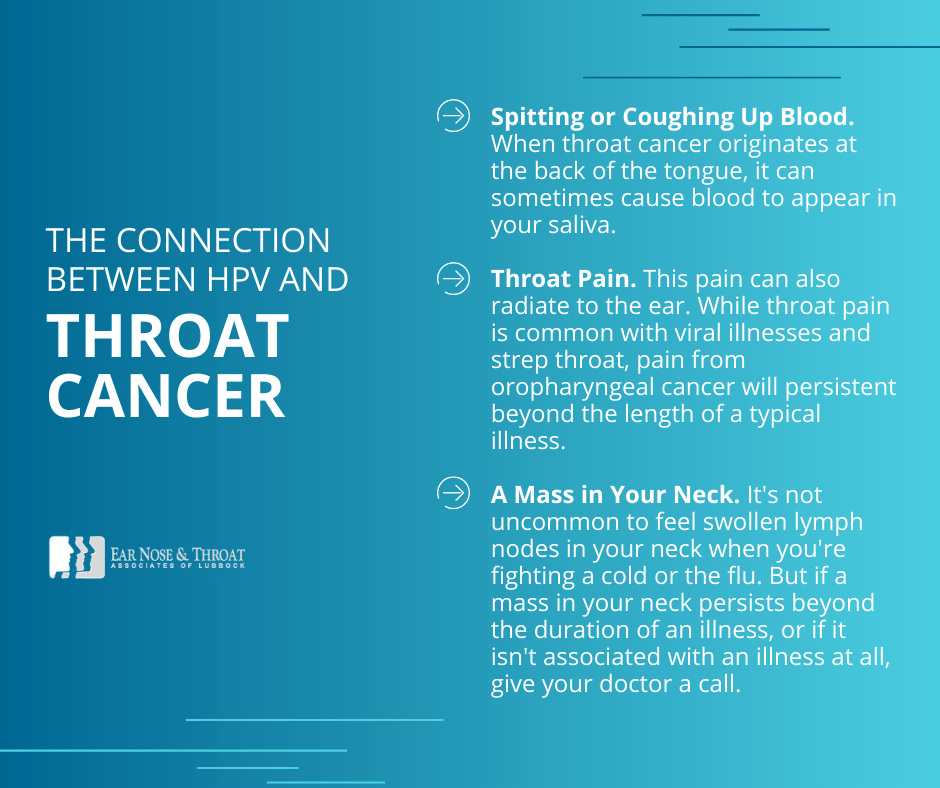Are Your Symptoms Human Papillomavirus or Throat Cancer?

Since the release of the first vaccine for human papillomavirus in 2006, we’ve heard a lot more about HPV and the health conditions linked to it.
Women are encouraged to get screened for HPV at their yearly gynecologist appointments since an HPV infection can lead to cervical cancer. But not everyone knows that HPV can lead to cancer in the throat as well.
This may leave you wondering, “What are the symptoms of human papillomavirus? How do I know if I have HPV? Could my HPV cause throat cancer?”
What Is the Human Papillomavirus and What Are Its Symptoms?
The human papillomavirus, usually referred to as HPV, is a specific type of virus.
There are more than 100 different strains of HPV, and most of them are harmless. An estimated 79 million Americans currently have some form of HPV infection, with another 14 million expected in the next year. Most of the time, though, HPV doesn’t cause any symptoms.
When you catch the flu virus, it usually causes you to feel pretty sick and have specific symptoms. Those symptoms let you know you probably have the flu. But since most people with HPV are asymptomatic, they won’t know they have the virus unless they get tested for it specifically.
You can’t feel HPV in your body, and your immune system can clear most types of HPV over time. But sometimes the virus doesn’t go away and instead reproduces, eventually leading to symptoms you notice.
For example, HPV can cause warts on various body parts. And unlike other viruses, HPV can cause several types of cancer, like cervical cancer and throat cancer. So while you won’t feel the presence of the virus itself, you could very well feel the symptoms of a cancer caused by the virus.

The Real Question: Do I Just Have a Sore Throat or Is It HPV Throat Cancer?
The real question isn’t whether you have HPV, but whether you have a run-of-the-mill sore throat or HPV throat cancer symptoms.
Historically, smoking and high levels of alcohol consumption have been the biggest risk factors for throat cancer. Recently, though, we’ve seen a trend of younger patients being diagnosed with throat cancer. In fact, up to 70% of oropharyngeal (mouth and throat) cancers are now associated with HPV!
Anyone exposed to HPV can develop HPV-associated throat cancer, but heterosexual males are most at risk because of current sexual practices in our society.
What Is Throat Cancer?
Cancer happens when normal cells in the body replicate and grow out of control. Most laryngeal (throat) cancers are a type of cancer known as “squamous cell carcinoma.” Squamous cells are the type of cells that line the back of the throat, where this cancer starts.
Throat cancer can originate in several areas, but most throat cancers caused by HPV start in the tonsils or on the back of the tongue.
The Connection Between Human Papillomavirus and Throat Cancer
You can’t feel HPV if it doesn’t cause your body’s cells to start growing out of control. But if HPV does lead to cancer, these are some human papillomavirus throat cancer symptoms you may notice.
Spitting or Coughing Up Blood
When throat cancer originates at the back of the tongue, it can sometimes cause blood to appear in your saliva. When the cancer is farther down, in the voice box, it can cause you to cough up blood.
If you notice blood in your saliva or after a cough, especially with no apparent cause, you should talk to your ENT doctor to investigate what’s happening.
Throat Pain
Cancer at the back of the throat can make it difficult or painful to swallow. This pain can also radiate to the ear.
While throat pain is common with viral illnesses and strep throat, pain from oropharyngeal cancer will persist beyond the length of a typical illness. You also probably won’t experience a fever or other symptoms of acute illness.
A Mass in Your Neck
It’s not uncommon to feel swollen lymph nodes in your neck when you’re fighting a cold or the flu. But if a mass in your neck sticks around beyond the duration of an illness, or if it isn’t associated with an illness at all, give your doctor a call. Sometimes throat cancer doesn’t cause any other initial symptoms, and this is the first sign people notice.
A mass in your neck doesn’t necessarily mean you have cancer, but you should schedule an appointment with your ENT doctor to see what’s going on.
Is It Time To Call a Doctor?
Any of the symptoms listed above warrant a call to an ENT doctor. While each symptom on the list can have other causes, remember that the symptoms of cancer don’t come and go. Cancer symptoms begin, persist and usually get worse.
Any lingering cough, continued spitting up of blood, pain in the throat or pain radiating to the ear, or a mass in your neck should prompt you to schedule a checkup.
If you’re worried you may have human papillomavirus throat cancer symptoms, contact ENT Associates of Lubbock today to schedule an appointment. Our physicians have the experience and knowledge to find the root cause of your symptoms and help determine the best course of treatment for you.
Dr. Cuthbertson is a physician at Ear Nose & Throat Associates of Lubbock. He joined the team at ENT Lubbock from Houston, where he was chief resident of the prestigious Bobby R. Alford Department of Otolaryngology at Baylor College of Medicine. He is board certified in Otolaryngology and Head & Neck Surgery and has quickly built a reputation, not only as an extremely skilled surgeon, but as an approachable and compassionate clinician adept in the newest standards and technologies. Learn more about Dr. Cuthbertson.
Categories:








